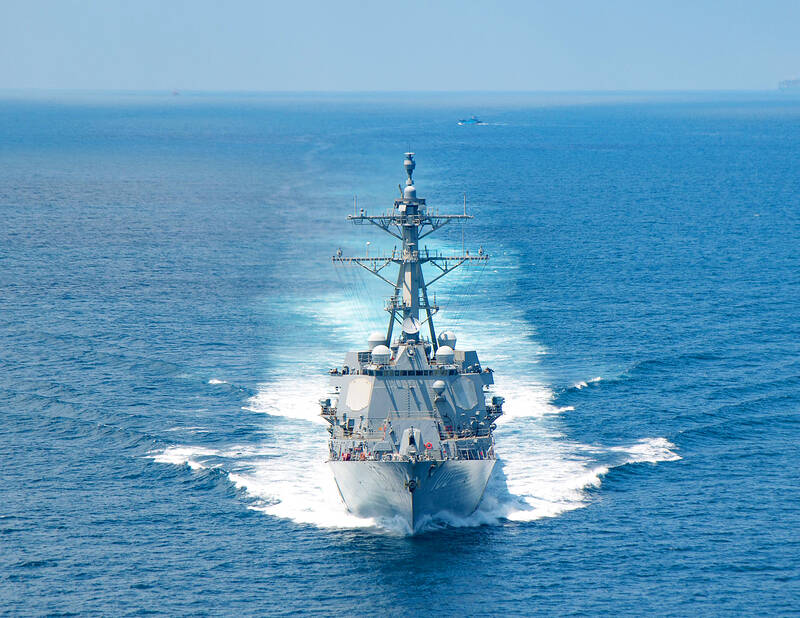US Seventh Fleet Commander Vice Admiral Karl Thomas on Friday reiterated the importance of conducting freedom of navigation operations in the Taiwan Strait, as he recognized Australia and Canada for their transits.
Speaking at a maritime security dialogue event hosted by the Center for Strategic and International Studies’ International Security Program and the US Naval Institute, Thomas said that China’s territorial claims in the region are beyond what the UN Convention on the Law of the Sea allows, and are illegal under an international tribunal ruling.
“It’s very important that we don’t accept [China’s claims] and that’s why do we do freedom of navigation operations,” he said.

Photo: AFP / US Navy
Thomas said the naval transits were intended to “push back, take a stand” so that China would not continue to move the ball down the field, giving a nod toward Australia and Canada for doing the same.
Arleigh Burke-class destroyer the USS Higgins and Canadian Halifax-class frigate the HMCS Vancouver traveled through the Taiwan Strait on Sept. 20, while Australian Majestic-class carrier the HMAS Melbourne sailed through the Taiwan Strait in September 2018.
Freedom-of-navigation operations are not all aimed at China, but are carried out to deter excessive claims by any nation, Thomas said.
China should take note that any country trying to use military force to expand its territory would meet resistance from the international community, he said, adding that every country should take heed that the US and like-minded nations would support friendly countries that have been illegally invaded.
“I think that we have a responsibility through the Taiwan Relations Act to provide defensive capabilities to Taiwan and to make sure that we are ready, and we are, and our desire to be — to have peaceful resolution of cross-strait differences,” Thomas said.
Regarding China’s response to US House of Representatives Speaker Nancy Pelosi’s visit to Taiwan in August, a response he called “irresponsible,” Thomas said that democratic nations must communicate with each other to understand and respond to each other’s needs.
China’s reaction of firing “ballistic missiles over Taiwan and have them land in the maritime commons and shipping lanes and some of them actually landing in the Japanese” exclusive economic zone was an overreaction, he said.
“I think that’s not the way that countries that want to be leaders within the world should behave,” he said.
Commenting on Beijing’s interactions with Moscow, Thomas said that it is a challenge calling on China to answer for its actions, as it often stays “below the radar” of the UN and international mechanisms even when it challenges the rules-based international order.

US President Donald Trump yesterday announced sweeping "reciprocal tariffs" on US trading partners, including a 32 percent tax on goods from Taiwan that is set to take effect on Wednesday. At a Rose Garden event, Trump declared a 10 percent baseline tax on imports from all countries, with the White House saying it would take effect on Saturday. Countries with larger trade surpluses with the US would face higher duties beginning on Wednesday, including Taiwan (32 percent), China (34 percent), Japan (24 percent), South Korea (25 percent), Vietnam (46 percent) and Thailand (36 percent). Canada and Mexico, the two largest US trading

AIR SUPPORT: The Ministry of National Defense thanked the US for the delivery, adding that it was an indicator of the White House’s commitment to the Taiwan Relations Act Deputy Minister of National Defense Po Horng-huei (柏鴻輝) and Representative to the US Alexander Yui on Friday attended a delivery ceremony for the first of Taiwan’s long-awaited 66 F-16C/D Block 70 jets at a Lockheed Martin Corp factory in Greenville, South Carolina. “We are so proud to be the global home of the F-16 and to support Taiwan’s air defense capabilities,” US Representative William Timmons wrote on X, alongside a photograph of Taiwanese and US officials at the event. The F-16C/D Block 70 jets Taiwan ordered have the same capabilities as aircraft that had been upgraded to F-16Vs. The batch of Lockheed Martin

GRIDLOCK: The National Fire Agency’s Special Search and Rescue team is on standby to travel to the countries to help out with the rescue effort A powerful earthquake rocked Myanmar and neighboring Thailand yesterday, killing at least three people in Bangkok and burying dozens when a high-rise building under construction collapsed. Footage shared on social media from Myanmar’s second-largest city showed widespread destruction, raising fears that many were trapped under the rubble or killed. The magnitude 7.7 earthquake, with an epicenter near Mandalay in Myanmar, struck at midday and was followed by a strong magnitude 6.4 aftershock. The extent of death, injury and destruction — especially in Myanmar, which is embroiled in a civil war and where information is tightly controlled at the best of times —

China's military today said it began joint army, navy and rocket force exercises around Taiwan to "serve as a stern warning and powerful deterrent against Taiwanese independence," calling President William Lai (賴清德) a "parasite." The exercises come after Lai called Beijing a "foreign hostile force" last month. More than 10 Chinese military ships approached close to Taiwan's 24 nautical mile (44.4km) contiguous zone this morning and Taiwan sent its own warships to respond, two senior Taiwanese officials said. Taiwan has not yet detected any live fire by the Chinese military so far, one of the officials said. The drills took place after US Secretary